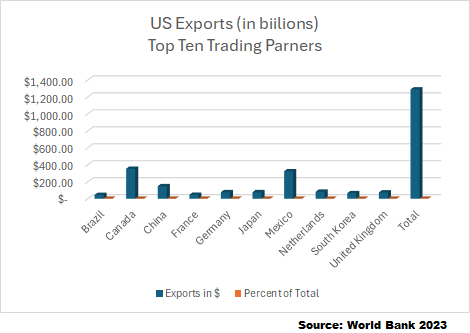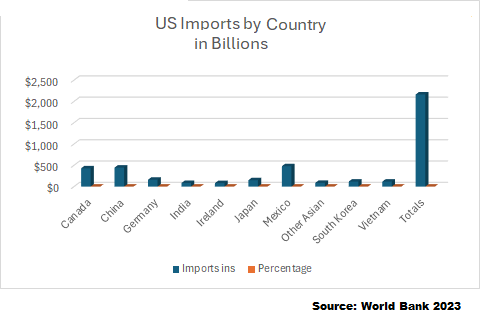President Trump fancies himself as antiwar, but not when it comes to a trade war. Trump has upended conventional Republican economic policies by using tariffs, a tax on imports, to coerce changes in American’s trade relationships with the world.
President Trump has convinced a lot of conservative economists to support is tariff policies in a second term who otherwise have abhorred, tariffs and protectionism. Some are having second thoughts.
Trump has made the case that we are at a big disadvantage globally maintain low tariffs and supporting “free” trade, when most countries have high tariffs and other barriers to American goods coming into their countries. The facts do show this.
During the Campaign, Trump talked about reciprocity. If a country has high tariffs and barriers, it’s only fair to match the tit for tat. But if they lower theirs, we will lower ours.
Coupled with the experience in his first term where he had some success in using the threat of tariffs to negotiate better deals, there was hope that the result might be fewer trade barriers and freer trade in the long run.
Maybe so, but we are off to a rocky start.

First, nobody really expected Trump to try to renegotiate deals with a 120 countries all at the same time. Considering we do most of our trade with about 15 nations, this doesn’t seem to make much sense. Even a master negotiator like Trump can’t add hours to the day!
We actually do a majority of our trade with just three countries Canada Mexico and China. We have legitimate issues with all three and these and a few other countries should be the focus.

Setting logistics of negotiating aside, the sweeping tariffs Trump announced on “liberation” were many things, but reciprocal was not one of them. They seemed arbitrary and affected good actors with the bad actors alike. Where’s the property? Didn’t seem to have anything to do with the numerous exceptions and pauses. This is that trump announced in the weeks that followed.
Also highly problematic have been shifting reasons for the tower of policy. Trump, increasingly touted the revenue that would be gained from the towers, making grandiose. Claims about closing the deficit and even replacing the income text. besides being unrealistic., this argument undermines the reciprocity argument, and he hope that this will eventually end up with lower tariffs across the board for everyone.
Another rationale, and I think has some merit, is to encourage companies to reshore production back to the United States. This could be good for economic reasons, but in some cases it would be important for national security. We are currently way too dependent on countries like China for essential goods like pharmaceuticals and resources like rare earth minerals. China in particular is an adversary that does not have our best interest in mind, and more than that. They have declared us their enemy whether we like it or not
Unfortunately, this is a lot easier said than done period he has been hammering apple and smartphone makers.
To move manufacturing to the united states when in the short term it is impossible. Best case is they could be up and running in 5 years at the cost of billions and with lower quality and much higher prices. The Wall Street Journal recently published an excellent analysis on this. It explains why Apple is decoupling with China and moving production to India, which has a much larger talent base in production management than the US and will minimize the disruption to its supply chain.
Historically, high tariffs have been justified because they can make domestic suppliers more competitive with overseas. The problem with this argument is that in many industries, such as smartphones and televisions, there are currently no domestic suppliers. That means there will be little incentive for the companies to absorb the tariffs, and are more likely to be passed on to consumers. It effectively becomes a type of consumption tax
Worse, Trump often falls back on the argument that running trade deficits equals losing money and getting ripped off. He only wants surpluses and never deficits.
Nonsense! First, with the exception that there is always some fraud in commerce, we got everything we paid!
Nobody talks about trade deficits between the 50 states, but that is because we all use the same currency. Chronic trade deficits for the nation as a whole causes currency and capital flows issues, but individually with specific countries they are not inherently good or bad. It depends on the context. Some countries have goods we need and we would be idiots to stop buying just to balance the books.
There are some signs that trump will work this out over time, but time is a diminishing resource. If the economy is not humming a year from now, say goodbye to the Republican congress and Trump is a lame duck.
The Republican plan working its way to Congress is not perfect, it never is, but there is enough good stuff in it to get the job done. Getting it through, coupled with the administration’ deregulation of energy, should offset some of the negatives of the trade dispute, that even the great negotiator himself admits we will bare in the short term.
By Kevin JudgeLet’s hope he keeps his eye on the ball, and Congress!
